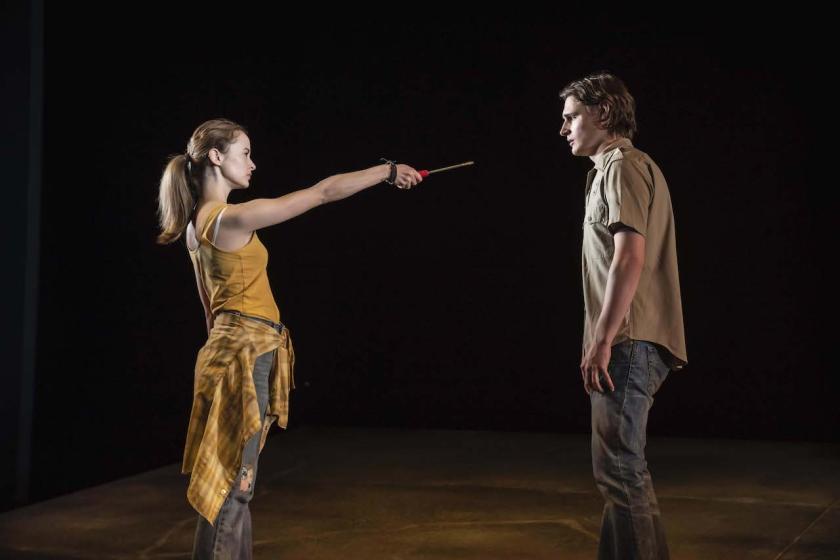Jude is the kind of girl that no-one would want to mess with – she can dance like a demon to Eric Clapton, skewer an ego in seconds and hit an apple from thirty feet with a knife. Yet in a play that’s so uncompromising it could give Neil LaBute a sprint for his money, what happens on the night of her seventeenth birthday raises questions that tear through the lives of her closest friends for decades.
Naomi Wallace’s script burns like ice. It’s a coming-of-age story that asks profoundly uncomfortable questions about money, sex, class and violence. Yet it works because it also makes you complicit, drawing you into a circle of teenagers who are all lost for different reasons. The stupid rich boys, the clever poor kids, all struggling for answers in an American society that is suffering an identity crisis because of the Vietnam war. How can anyone here emerge as a winner?
It has taken years for The Breach to be presented in an English-speaking production, in part because the Actors Theater of Louisville – who commissioned it – felt that some of the issues raised were too close to the bone. Without wanting to provide any spoilers, you can see why producers operating in the #MeToo era were nervous, but equally it’s a shame that they didn’t recognise Wallace’s courage in investigating the complex psychological wounds that shape deeply regrettable actions.
Sarah Frankcom’s production takes the characters between the Seventies and the early Nineties, on a bare stage set at a rake to resemble the cellar where the teens at the centre of the drama stake out their territory. Jude and Acton are clever but poor; scarred by their father’s death in an industrial accident and ravenous to survive through their wits. Hoke is a rich boy whose father owned the company for which Jude and Acton’s father worked, Frayne is his sidekick.
 Wallace has written for this website about her own teenage in Kentucky where, in the Seventies, "the combustibles of love, lust and loyalty were our fuel". Her challenge as a playwright is to express the profound moral dilemmas of individuals who are powered by attitude but do not have the emotional equipment or the articulacy to understand themselves.
Wallace has written for this website about her own teenage in Kentucky where, in the Seventies, "the combustibles of love, lust and loyalty were our fuel". Her challenge as a playwright is to express the profound moral dilemmas of individuals who are powered by attitude but do not have the emotional equipment or the articulacy to understand themselves.
Maybe it’s no surprise then that it’s the scenes set in the Seventies that burn the brightest, as Jude, her brother Acton, Hoke and Frayne build their precarious hormonal friendship through a system of dares. Stanley Morgan’s nervous, wide-eyed Acton is the most academically bright but here he is exposed as a weakling; like all three boys he is mesmerised by Shannon Tarbet’s ruthlessly independent Jude.
By the time they reach the adult scenes, one of their group is dead. Here you feel Wallace could have expanded her pared-to-the-bone dialogue to look more broadly at the forces that have impacted on the grown-ups who revisit the cellar that was the nerve centre for all their dreams and warped aspirations. Several questions are left hanging, not least over Tom Lewis’s defiantly blinkered Hoke, who boasts about his wealth and his happy family even as he surveys the wreckage of the lives of those who grew up with him. (His younger self is played by Alfie Jones, pictured above).
Yet this is powerful theatre not least because it creates the same kind of discomfort in the viewer as, say, LaBute’s film In The Company of Men. Except there the characters are grown up enough to take full responsibility; here you must ask several questions about where the blame lies and who the victims truly are. At the same time as you furiously condemn what has taken place, in the Seventies the two dominant currencies of capitalist life were wealth and sex. How as a teen do you negotiate that? Especially when the fallout from Vietnam means that your society is dominated by death, disability from war and profound political disillusionment.
The Breach then, vividly immerses you in its wild-at-heart world before sending you out into the night with a strong sense of unease. It’s good to see such challenging programming at the Hampstead; even if the play is slightly let down by its later sections, you will not quickly forget the raw power of Wallace’s brave and uncompromising writing.
@Hallibee1















Add comment